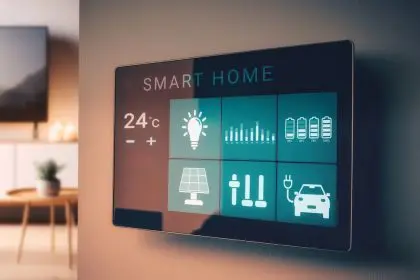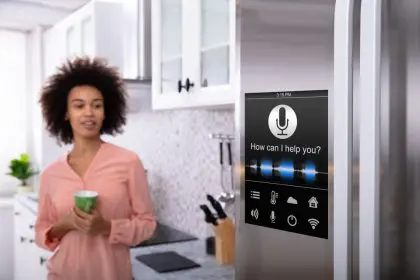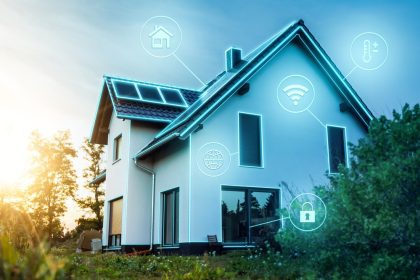Homeowners are increasingly turning to smart home technology as a way to enhance their living experience. This shift isn’t just about convenience; it’s also about making a sound investment in the future. The integration of smart home technology can significantly boost property value, offering a substantial return on investment.
Whether you’re planning to sell your home soon or just want to increase its value, understanding the impact of smart home technology is crucial.
The appeal of smart homes
The allure of smart homes extends far beyond the novelty of controlling lights with your voice or adjusting your thermostat remotely. It’s about creating a home that adapts to your lifestyle, offering enhanced security, energy efficiency, and comfort. As more homebuyers become tech-savvy, the demand for smart homes is rising. Properties equipped with smart home technology are seen as more desirable, making them stand out in a competitive real estate market.
Smart home features like automated lighting, smart thermostats, and advanced security systems not only add convenience but also appeal to environmentally conscious buyers. These systems help reduce energy consumption, leading to lower utility bills and a smaller carbon footprint. Homebuyers today are more aware of the long-term benefits of energy-efficient homes, and smart technology plays a significant role in meeting this demand.
Enhancing security and peace of mind
One of the most compelling reasons homeowners invest in smart home technology is for the enhanced security it provides. With features like smart locks, video doorbells, and surveillance cameras, homeowners can monitor their property in real-time, whether they’re at home or halfway across the world. This level of security is a significant selling point for potential buyers.
Moreover, smart security systems often include sensors that can detect unusual activity, such as a door or window being opened unexpectedly. These systems can send alerts directly to your smartphone, allowing you to take immediate action. The peace of mind that comes with knowing your home is protected by the latest technology is invaluable, and it’s a feature that can significantly boost your home’s market value.
Energy efficiency and cost savings
Energy efficiency is another major factor that contributes to the increased property value of smart homes. Smart thermostats, for instance, learn your schedule and adjust the temperature accordingly, ensuring that you’re not wasting energy when you’re not home. Over time, this can lead to substantial savings on your energy bills.
Additionally, smart lighting systems allow you to control lights remotely or set them on a schedule, reducing unnecessary electricity use. Some systems even have sensors that detect when a room is empty and automatically turn off the lights. These energy-efficient features are highly appealing to buyers who are looking to save money on utilities and reduce their environmental impact.
Homebuyers are increasingly looking for properties that offer long-term savings, and energy-efficient smart home technology meets this need. By reducing energy consumption and lowering utility costs, smart home features make properties more attractive and, ultimately, more valuable.
Convenience and customization
Smart home technology also offers unparalleled convenience and customization options, which can make a property more appealing to potential buyers. Imagine walking into a home where the lights, temperature, and even music are automatically adjusted to your preferences as you enter. This level of personalization creates a luxurious living experience that many buyers are willing to pay a premium for.
Voice-activated assistants like Amazon’s Alexa or Google Assistant can control various smart devices in the home, from adjusting the thermostat to locking the doors. The ability to manage your home with simple voice commands or through a smartphone app is a feature that appeals to tech-savvy buyers, making your property stand out in the market.
Additionally, smart home technology allows for easy integration of new devices as technology evolves. This means homeowners can continuously upgrade their systems without the need for major renovations, ensuring that their home remains modern and up-to-date. This adaptability is a significant selling point for buyers who want a home that can grow with their needs.
The investment in resale value
While the initial cost of installing smart home technology can be significant, the return on investment is often worth it. Homes equipped with smart technology can command higher prices in the real estate market. According to a report by Coldwell Banker, homes with smart technology sell faster and at higher prices than those without. This is because smart technology is no longer seen as a luxury but as a standard expectation among modern homebuyers.
Moreover, smart home technology can make a property more appealing to a broader range of buyers. From young professionals who value the convenience of technology to older buyers who appreciate the added security and energy savings, smart homes have a wide appeal. This leads to increased competition among buyers, driving up the property’s value.
The future of smart homes
As technology continues to evolve, the future of smart homes looks promising. Innovations like artificial intelligence, machine learning, and the Internet of Things (IoT) are set to revolutionize the way we live. Homes that are equipped with the latest technology will not only offer more convenience and efficiency but are becoming more desirable in the eyes of buyers.
In the coming years, we can expect to see even more advanced smart home features, such as automated home maintenance systems, personalized health care monitoring, and fully integrated smart neighborhoods. Investing in smart home technology now can position your property as a cutting-edge, future-proof asset, ensuring that it remains competitive in the real estate market in the long run.
This story was created using AI technology.

















